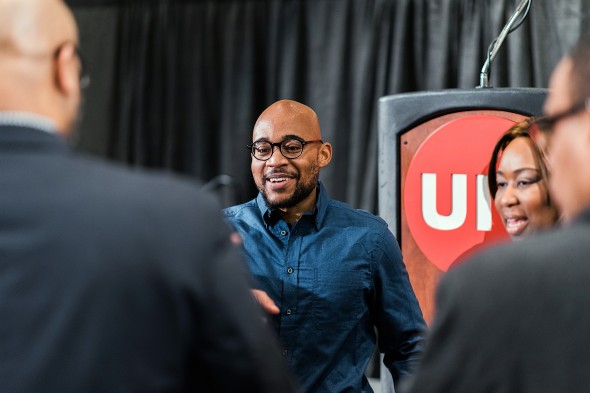Mizzou activist talks hunger strike, making a difference

“It’s up to us to find our role in this movement and fight for it,” says University of Missouri student Jonathan Butler. — Steve Scapardine © 2016 via Life Made Still
The University of Missouri is home to more than 30,000 students, but few are as well known as Jonathan Butler.
In October 2015, Butler incited a movement, first on his campus, then across the country. He organized an eight-day hunger strike in an effort to draw attention to the racial injustices black people face on and off campus, which ended with the resignation of Mizzou’s chancellor and president.
Butler is continuing the conversation on college campuses across the nation. He spoke with UIC students Feb. 18 in Student Center East as part of Black History Month events.
Butler’s first objective was to make the environment feel inclusive and intimate. The audience was encouraged to offer thoughts on racial disparities and sit closer to each other and the stage.
“If y’all want to clap, snap, whatever y’all wanna do, or boo, then we’ll work through this together,” he said.
Butler touched briefly on the hunger strike, but wanted to center the discussion on UIC students.
“[There’s] a lot more diversity [here] than what you can physically see at the University of Missouri, a big difference,” Butler said. “You guys have a lot of social activism. My question to you guys is what’s wrong then?”
One by one students rose to share their stories of discrimination. Students in attendance intently listened, some offering some encouragement.
Butler posed a question to the audience, one that set the theme for the rest of his speech: “What is your sacrifice for liberation and what is the consequence of your silence?”
Daniela Padilla, a peer mentor in Campus Housing, encourages her peers to get informed and speak out.
“A lot of people our age are still deciding what they believe in and what they don’t believe in,” Padilla said. “If you want to have something to say, you should be coming to these events and coming up with a conclusion instead of coming to the conclusion and not going to anything.”
Butler stressed the importance of having a voice.
“It’s up to us to find our role in this movement and fight for it,” Butler said. “Let me make it very clear. Nobody gets free until we all get free. All of our identities, all of our struggles, are united.”
Categories
